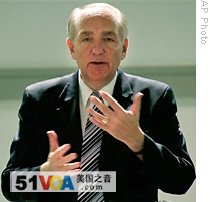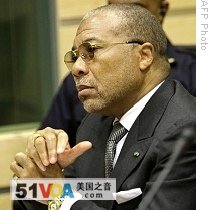Dakar
04 March 2009
 |
| War crimes prosecutor Stephen Rapp (file photo) |
Unlike the international criminal courts for Rwanda and the former Yugoslavia, the special court for Sierra Leone is not funded by mandatory dues. It is supported by voluntary contributions.
Some of those contributions have slowed as the global economic crisis forced many developed economies to reconsider spending in the face of growing budget deficits. That has left the special court's budget $5 million short at a time when it has only one case left to decide - the 11-count war crimes indictment against Mr. Taylor.
If the money runs out, Prosecutor Stephen Rapp expects defense lawyers to ask for Mr. Taylor's release.
"The defense would be in there trying to move to get Taylor freed because it wouldn't be fair to hold him if he couldn't be tried. And that would be a strong argument on their part. We would, of course, resist it. We would fight to keep him detained. But that is the kind of risk that a court faces. You can't hold somebody in jail indefinitely unless you are able to give him a trial," he said.
 |
| Former Liberian President Charles Taylor sits in courtroom prior to hearing of witnesses in trial in The Hague, 08 Jan 2008 |
He has pled not guilty. The prosecution rested its case last week. Oral submissions from the defense are scheduled to begin April 6 on a Motion for Judgment of Acquittal.
Reaction mixed to Taylor's possible release
News that the former Liberian leader could go free brought mixed reactions in the capital Monrovia.
Mr. Taylor's first cousin Sando Johnson said it is no surprise because the Taylor family believes prosecutors are using budget problems as an excuse to save them the embarrassment of a not-guilty verdict.
"It is a face saving from the prosecution. The prosecution has nothing to convict Mr. Taylor. There is no evidence. So they are embarrassed," he said.
The indictment alleges that Mr. Taylor led members of Sierra Leone's rebel Revolutionary United Front across the border and acted as their effective leader for much of a ten-year civil war that killed at least 50,000 people. Johnson said it is not true.
"We know fully well that Mr. Taylor did not commit any crimes in Freetown," he said.
Other Liberians are less enthusiastic about prospects for Mr. Taylor's release.
"He can not go with impunity," said Lamin Weah.
Monrovia businessman Lamin Weah said news of a funding shortfall at the special court is most unwelcome because Mr. Taylor's release could lead to more violence.
"We think the international community should do everything to support the international court so Mr. Taylor's trial can continue because if they do not find the money and Mr. Taylor is free, there is the possibility for the sub-region to be in another instability," he said.
University student Williams Toe said no matter how long Mr. Taylor stays away, there will be more fighting in Liberia if he returns because the former rebel leader still has supporters.
"Even if he stays 10 years or 15 years in another country, he still has to come back to Liberia," said the student.
Mr. Taylor's trial was moved to The Hague because of fears that his supporters might disrupt proceedings held in neighboring Sierra Leone.
The Freetown session of the special court reached its final verdict last month, finding the three most senior surviving members of the rebel RUF guilty of murder, sexual enslavement, and attacks against U.N. troops.
A verdict in Mr. Taylor's case is expected later this year.